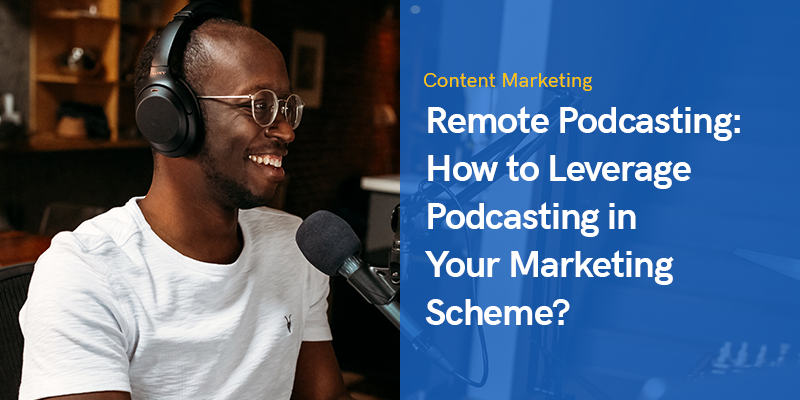
Remote Podcasting: How to Leverage Podcasting in Your Marketing Scheme?
As someone who hit the ground running during the dawn of podcasting (my first remote podcast recording was back in 2008), it’s been my privilege to see the medium grow before my eyes.
I embarked on my marketing career much later, so I come to podcast marketing with a holistic view of the medium: what it’s fit for and what it isn’t.
So read on for a short but immediately actionable guide of how to leverage remote podcasting in marketing.
A Brief Note on Remote Podcasting
For me, podcasting has always been remote.
I know many of you probably came to podcasts via the most famous podcaster in the world — Joe Rogan — who has a brilliant man-cave studio.
And that’s great — in fact, it’s optimal for building rapport with your podcast guests, but it’s by no means necessary.
There are tricks you can use to build rapport fast; there’s a whole other article there. This doesn't quite get into the nitty gritty of how to start a podcast, we'll stick to the value of remote podcasting today.
But for now, rest assured: remote podcasting is perfectly viable; in fact, it’s the way many of your favorite shows have always been recorded.
The Usefulness of Remote Podcasting in Marketing
There are many ways to leverage remote podcasting in your marketing.
They are: branding and establishing authority; creating SEO gold; networking; and, of course, everyone's favorite five-letter word… SALES!
As we go over each strategy, I’ll outline some quick, actionable steps, so you can hit the ground running.
Of course, all the following points assume that you have an exciting show.
It should go without saying, but just to make it clear: subpar content will hurt your marketing efforts, not improve them.
There’s enough crap out there.
Don’t add to it.
Leverage Remote Podcasting to Establish Authority and Improve Your Branding
It doesn’t matter if your business is B2B or B2C, SaaS, or vegan whole-foods.
Every customer arriving at your website or social profile will have the same question in their minds: “Do these people know their stuff?”
Your podcast can be a solid and persuasive argument for a “Yes, yes they do.”
This is especially the case if the show has been running for a few months already — sorry, no-one is impressed by the “minimum effort” six-episode run that a Netflix exec green-lit to please their niece.
Anyone can farm content to a Romanian troupe of poorly paid writers and churn out blog posts by the bucketload.
Podcasting is something you can’t fake, especially if the host is someone with actual first-hand knowledge of the business or industry.
If you have a podcast talking about your brand and industry, you have skin in the game, you are putting your face forward for the business, and customers value that.
So: commit to a long-term project, and put yourself out there.
Talk about real stuff relevant to your industry and audience; don’t make it a 30-to-45-minutes-long commercial.
Podcasting is Your Ticket to Create SEO Gold
So, you’re mad at me because I dissed your Romanian Blog Post Farming efforts.
“It’s valuable content, Luís! I need the SEO juice! I HAVE NO CHOICE DON’T JUDGE MEEEEEE!”
Whoa, whoa, sorry, I didn’t mean to hurt you.
But I have good news! You can scrap that strategy.
For the cost of your average farmed blog post, you can instead pay someone to transcribe your podcast episodes!
Each episode (assuming you get close-ish to the one-hour mark) will become a chunky article that Google will love because it will be conversational and have many organically occurring keywords.
(Again, I’m assuming you talk about stuff that people care about.)
Of course, this is not a zero-effort process… After the transcript, you still need to do a nice editing pass, optimize keywords, insert some shiny images, etc.
But the bulk of the “work” will already have happened during the recording.
Huzzah for smart content recycling!
Remote Podcasting is the Portal to Better Networking
You might think this one is a stretch, right? How can you leverage remote podcasting for networking? And why should you care?
Well, in an increasingly remote world, networking is like Tesla stock: the value doubles every day.
Every salesperson I talk to has the same problem: it’s more complicated than ever to reach prospects, mainly because live events (conferences, industry fairs, etc.) are either off the table or greatly limited in their scope.
Even if you are in a business that doesn’t use a salesforce, networking is still how you get new, better ideas — and partnerships — that move your business forward.
So, how do you get to the best Facebook Groups, LinkedIn connections, or that elusive online community that hosts precisely the people you need to reach?
It’s all about whom you know.
Chicken and egg problem, right? How can you know the movers and shakers in the community if you aren’t a part of the community? You invite them to be guests on your podcast.
Mind-blowing, I know.
The most significant benefit I got from hosting the DistantJob podcast, which is a podcast about leading and managing remote teams, was the direct access to over 100 leaders in the remote work space, from companies ranging from Microsoft to Buffer.
Of course, you won’t get the heavy hitters immediately.
But if you have a show that looks well-produced AND if you are a gracious, engaging host who asks interesting questions… You start with a couple of friendly people wanting to increase their online presence, and it becomes easy to go up the influencer ladder.
Hosting the DistantJob podcast also led me to significant business opportunities related to remote work, such as founding and managing ThinkRemote, a news and media company about remote work.
While the whole idea of creating and conducting a podcast might seem like a slow marketing strategy, it brings far more opportunities and benefits that can take your brand to the next level.
You Can Make Sales In Remote Podcasting, Too
Look, I’m not going to lie to you: there’s a reason this is the last thing.
Of all your marketing efforts, podcasting is probably the least likely to bring in leads that convert into sales.
But if you don’t do it, you’re leaving money on the table, and that’s no bueno.
If you don’t have sponsors — this is important — people won’t mind going through a minute or so of you selling your wares a couple of times per show.
Most podcasters pre-record an ad-like segment and place it at the start and end of the show.
That’s a low-effort thing you can do, and it’s better than nothing, but I urge you to take a different approach and do it during the recording.
Two reasons for that:
- It sounds more organic.
- It’s a way to sell to your podcast guest (assuming you have one) without selling to your podcast guest.
Again, the success ratio is tiny, but you lose nothing from doing it.
Your guest will probably space out while you pitch your audience (a sign you need to improve your pitch!) or not be interested at all.
But maybe they will know someone interested and offer to make introductions.
Or perhaps they will think your product is worth sharing with their audience.
The point is: there’s no downside to doing a sales pitch during a podcast.
(As long as you don’t make it super long and blindingly dull.)
It’s Time to Leverage Remote Podcasting in Your Marketing Strategy
Podcasting is the sweet spot between the signal-to-noise ratio of blog posting and the massive workload of video.
After you get your groove, you’re likely to pump out a good episode for a couple of hours per week.
That’s a small-time investment, given the potential upside from all the benefits I’ve outlined.
The key, though, is that you need to be (or have access to) someone who loves talking about the subject.
A boring podcast won’t add anything to your marketing.
But you already knew that.
So get out there, start recording, pitch exciting guests, and reap the benefits!
Recommended Posts

What Is Inbound Marketing and Why Is It Important in 2023?
April 14, 2023

10 Best Blogging Platforms for 2023
January 19, 2023
